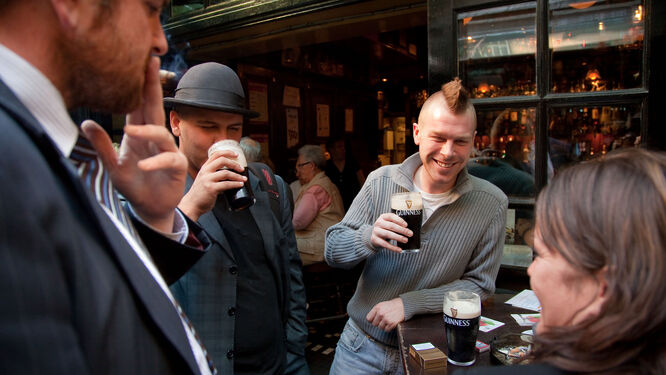Connect with People

Previous:
One of the greatest rewards of travel comes from the people you encounter — especially if you're open to letting them show off a bit and impress you with their culture. As a traveler, I make a point to be a cultural lint brush — trying to pick up whatever cultural insights I can glean from every person I meet.
In our daily routines, we tend to surround ourselves with people more or less like us. It's the natural thing to do. But on the road, you meet people you'd never connect with at home. In my travels, I meet a greater variety of interesting people in two months than I do in an entire year back home. I view each of these chance encounters as loaded with potential to teach me about people and places so different from my own milieu.
For example, one of my favorite countries is Ireland — not because of its sights, but because of its people. Travel in Ireland gives me the sensation that I'm actually understanding a foreign language. And the Irish have that marvelous "gift of gab." They love to talk. For them, conversation is an art form.
Actually, more Irish speak Irish than many travelers realize. Very often you'll step into a shop, not realizing the locals there are talking to each other in Gaelic. They turn to you and switch to English, without missing a beat. When you leave, they slip right back into their Gaelic.
The best place to experience Ireland is in a Gaeltacht, as Gaelic-speaking regions are called. These are government-subsidized national preserves for traditional lifestyles. In a Gaeltacht, it seems like charming and talkative locals conspire to slow down anyone with too busy an itinerary.
I was deep into one conversation with an old-timer. We were on the far west coast of the Emerald Isle — where they squint out at the Atlantic and say, "Ahhh, the next parish over is Boston." I asked my new friend, "Were you born here?" He said, "No, ‘twas 'bout five miles down the road." Later, I asked him, "Have you lived here all your life?" He winked and said, "Not yet."
In even the farthest reaches of the globe, travelers discover a powerful local pride. Guiding a tour group through eastern Turkey, I once dropped in on a craftsman who was famous for his wood carving. Everybody in that corner of Turkey wanted a prayer niche in their mosque carved by him. We gathered around his well-worn work table. He had likely never actually met an American. And now he had 15 of us gathered around his table. He was working away and showing off…clearly very proud. Then suddenly he stopped, held his chisel high into the sky, and declared, "A man and his chisel — the greatest factory on earth."
Looking at him, it was clear he didn't need me to tell him about fulfillment. When I asked if I could buy a piece of his art, he said, "For a man my age to know that my work will go back to the United States and be appreciated, that's payment enough. Please take this home with you, and remember me."
I traveled through Afghanistan long before the word Taliban entered our lexicon. While there, I enjoyed lessons highlighting the pride and diversity you'll find across the globe. I was sitting in a Kabul cafeteria popular with backpacking travelers. I was just minding my own business when a local man sat next to me. He said, "Can I join you?" I said, "You already have." He said, "You're an American, aren't you?" I said yes, and he said, "Well, I'm a professor here in Afghanistan. I want you to know that a third of the people on this planet eat with their spoons and forks like you, a third of the people eat with chopsticks, and a third of the people eat with fingers like me. And we're all just as civilized."
As he clearly had a chip on his shoulder about this, I simply thought, "Okay, okay, I get it." But I didn't get it...at least, not right away. After leaving Afghanistan, I traveled through South Asia, and his message stayed with me. I went to fancy restaurants filled with well-dressed local professionals. Rather than providing silverware, they had a ceremonial sink in the middle of the room. People would wash their hands and use their fingers for what God made them for. I did the same. Eventually eating with my fingers became quite natural. (I had to be retrained when I got home.)
Next:

